- Home
- Michael Shaara
The Killer Angels: The Classic Novel of the Civil War Page 10
The Killer Angels: The Classic Novel of the Civil War Read online
Page 10
It died in massive fire. There were still no cannon on the other side. Calef’s battery blasted the mist, thunder among the lighter fire. The assault began to die away.
The wounded were beginning to come back off the line. Buford went down from the cupola, restless, found Bill Gamble in the field by Calef’s battery, checking ammunition. There was blood on his left sleeve. His nose was still running. He grinned wetly at Buford.
“Hey, General. That was quite a scrap.”
“How are your losses?”
“Not bad. Not bad at all. We were dug in pretty good. We got ’em right out in the open. Really got a twist on ’em. Arrogant people, you know that? Came right at us. Listen, we got some prisoners. I talked to ’em. They’re Harry Heth’s division, of Hill’s corps. That’s what I’ve got in front of me.”
Buford nodded. Gamble was talking very quickly, head moving in jerky twitches.
“Sir, as I remember, Heth’s got near ten thousand men. They’re all within sound of the fight, back that road, between here and Cashtown.”
Buford squinted. The rain had quit but the sky was still low and gray. He could see a long way off through the trees, and there were ragged bodies in the fields, groups of men digging, cutting trees for cover.
Gamble said, “Sir, he’ll be back with all ten thousand.”
“It’ll take him a while to deploy,” Buford said.
“Yes, but he’s got Hill’s whole corps behind him. Maybe twenty-five thousand. And Longstreet behind that. And Ewell in the north.”
“I know.”
“Thing is this. When John Reynolds gets here, he won’t have the whole army with him, only a part of it. Point is—” he sniffled, wiped his nose “—as I see it, the Rebs will be here this afternoon with everything they’ve got.”
Buford said nothing. Gamble sniffed cheerily.
“Just thought I’d mention it. Now, what you want me to do here?”
Buford thought: if it was a mistake, God help us.
“Heth will be back in a bit,” Buford said. “If he’s got any brains at all, and he’s not stupid, he’ll know by now that he’s got a brigade in front of him. Don’t think he’ll wait to get his whole division in line. That would take half the morning.”
“He doesn’t need his whole division.”
“Right. Does Devin report any activity on his front?”
“Not a thing.”
“All right. I’ll have Devin pull some of his people out and leave a cover in the north and have him dig in alongside, lengthening your line. When Heth comes back he’ll run into two brigades. That should hold him until Reynolds gets here.”
“Right,” Gamble said. He peered up at the sky. “Glad the rain is gone. Don’t want anything to slow up Reynolds.”
“Take care of yourself.”
“You know me: the soul of caution.”
Buford moved off toward the north. He sent a second message to Reynolds. He pulled Devin out of line in the north and brought him in alongside Gamble: two thousand men facing west. All that while whenever he came near the line he could see enemy troops moving in the fields across the way, spreading out as they came down the road, like a gray river spreading where it reaches the sea. If Heth was efficient and deliberate he had the power to come straight through like an avalanche. Buford could hear the artillery coming into place on the far side, heard the spattering of rifle fire from probing patrols. He looked at his watch; it was after eight. Reynolds had to be on the road. The infantry had to be coming. He rode back and forth along the line, watched Devin’s men digging in, heard bullets clip leaves above him as snipers crawled closer. We cannot hold ten thousand. Not for very long. If Heth attacks in force he will roll right over us, and we lose the two brigades and the high ground too, and it will have been my fault. And the road in the north is open; they can come in there and they’ll be behind us, on our flank.
There was nothing he could do about that; he had no more troops. But he pulled a squad out of Devin’s line and put the young Lieutenant with corn-silk hair in charge and gave him orders.
“Son, you ride on out that road to the north about five miles. You squat across some high ground, where you can see. First sign you get of enemy coming down that road, you ride like hell this way and tell me. Understand?”
The squad galloped off. A cannon shell burst in the air nearby, raining fragments in the wet leaves around him. The first Reb cannon were in position, limbering up easily, casually, getting the range. Now Buford had a little time to think. It all depends on how fast Reynolds comes. It all depends on how many men he’s got with him and how fast Lee is moving this way. Nothing to do but fight now and hold this line. But he kept looking at his watch. There ought to be some word. He galloped back to the seminary and climbed the cupola and gazed back to that southern road, but there was nothing there. A short while after that he saw the enemy come out in the open, line after line, heard the guns open up, dozens of guns, watched his own line disappear in smoke. The big attack had come.
Gamble was down. The first report was very bad, and Buford rode over and took command, but it was only concussion and Gamble was back on his feet in a few moments, ragged and dirty. There was a breakthrough on the right but some junior officers patched it. Lone infantry began bending around the right flank. Buford mounted some men and drove them off. There were moments in smoke when he could not see and thought the line was going; one time when a shell burst very close and left him deaf and still and floating, like a bloody cloud.
On the right there was another breakthrough, hand-to-hand fighting. He rode that way, leaping wounded, but it had been repulsed when he got there. One by one Calef’s guns were being silenced. No one had yet broken away, no one was running, but Buford could feel them giving, like a dam. He rode back to the seminary, looked down the road. Nothing. Not much more time. He felt the beginning of an awful anger, an unbearable sadness, suppressed it. He rode back to the line. The fire was weakening. He stood irresolute in the road. An aide suggested he go to cover. He listened. The Rebs were pulling back, forming to come again. But the Reb cannon were pounding, pounding. He heard the great whirring of fragments in the air, saw air bursts in bright electric sparks. He rode slowly along the smoking line, looking at the faces. The brigades were wrecked. There was not much ammunition. They were down in the dirt firing slowly, carefully from behind splintery trees, piled gray rails, mounds of raw dirt. They had maybe half an hour.
Pull out before then. Save something. He rode back toward the seminary. He climbed the cupola, looked out across the field of war. Wreckage everywhere, mounded bodies, smoking earth, naked stumps of trees. He could see a long way now, above the rolling smoke which had replaced the mist, and the road coming down from the far-off mountains was packed with soldiers, thousands of soldiers, sunlight glittering on jeweled guns. He looked toward the south—and there was Reynolds.
He was coming at a gallop across the fields to the south, a line of aides strung out behind him, cutting across the field to save time. No mistaking him: matchless rider gliding over rail fences in parade-ground precision, effortless motion, always a superb rider. Buford blinked, wiped his face, thanked God. But the road behind Reynolds was empty.
The General rode into the yard below, dismounted. Buford waited in the cupola, weariness suddenly beginning to get to him in waves. In a moment Reynolds was up the ladder.
“Good morning, John.”
An immaculate man, tidy as a photograph, soft-voiced, almost elegant. Buford put out a hand.
“General, I’m damned glad to see you.”
Reynolds stepped up for a look. Buford explained the position. In all his life he had never been so happy to see anybody. But where was the infantry? Reynolds swung, pointed a gloved hand.
The blue line had come around the bend. Buford saw with a slight shock the first column of infantry, the lovely flags. Reynolds said softly, “That’s the First Corps. The Eleventh is right behind it.”
Buford watched
them come. He leaned against the side of the cupola. Reynolds had turned, was surveying the hills to the south. There was a set, hard, formal look to him, but a happiness in his eyes. Buford thought: he has brains to see.
Reynolds said, “Good job, John.”
“Thank you.”
“This is going to be very interesting.”
“Yes,” Buford said.
“They seem to be forming for another assault. That’s Harry Heth, isn’t it? Very good. He’ll come in here thinking he’s up against two very tired cavalry brigades, and instead he’ll be hitting two corps of fresh Union infantry.” Reynolds smiled slightly. “Poor Harry,” he said.
“Yes, sir,” Buford said.
“You can start pulling your boys out. As soon as we set up. Well done. Well done indeed. You can put them out on my flanks. Keep an eye on that north road. I expect Dick Ewell to be coming in shortly.”
“Yes, sir.”
They went down out of the cupola. Reynolds mounted a beautiful black horse. Buford came out into the open, saw his staff tidying itself up, combing hair, buttoning buttons. Shells were falling on the ridge nearby and bullets were slicing leaves, but Reynolds sat astride the horse in a motionless calm, looking out toward the fight, picture of a soldier, painted against the trees. Reynolds called in one of his officers. He said slowly, somewhat delicately, pronouncing each word in turn, evenly, machinelike, “Captain, I want you to ride as fast as you can to General Meade. Tell him the enemy is advancing in strong force and that I am afraid they will get the heights beyond the town before I can. We will fight them here inch by inch, through the town if necessary, barricading the streets. We will delay them as long as possible. I am sending messages to all my commanders to come to this place with all possible speed. Repeat that.”
The Captain did, and was gone. Reynolds sent messages to other commanders: Doubleday, Sickles. Then he said, to Buford, “I think I’ll move over and hurry the boys along.”
“Obliged,” Buford said.
“Not at all.” He wheeled the horse gracefully, still something of that elegant quality of display in the fluid motion, and rode off. In the direction he took Buford heard music. A blue band was playing. Buford issued his own orders. The great weight was off him. Now it belonged to Reynolds. And there was no regret. Through most of his life he had resented the appearance of higher command. Now it came to save him. A new thing. He did not mind at all. Must be the age. Well, you have gone to the limit, lad. You have reached your own personal end.
Tom Devin was up. He was annoyed to be pulled out. Buford looked at him, shook his head. In a moment Reynolds was back, leading blue troops at double time through the fields, tearing down rail fences as they came. Buford’s heart was stirred: the Black Hats, Simon Cutler’s Iron Brigade, best troops in the Union Army. An omen. They began to move out onto the road by the seminary, regiment after regiment, moving with veteran gloom, veteran silence, steady men, not many boys. One man was eating cherries hurriedly from a mess tin; another had a banjo on his back which was bothering him, and he swung it around to cover his front and banged the man in front of him, who complained, to peculiar laughter. One man asked one of Buford’s aides loudly which way was the war and offered to go the other way, and an officer turned and began sending them into line along the crest Gamble had held. Then Reynolds was back.
The Rebel shells were beginning to pass overhead. They had seen new troops coming and some of the fire was falling now on Gettysburg. Reynolds summoned another aide.
“Lieutenant, get on into town and tell these people to stay in off the streets. There’s liable to be a fair-sized dispute here today, and give anyone you meet my compliments, along with my suggestion that every person stay indoors, in cellars if possible, and out of harm’s way. Especially children.” He peered at the aide. “Joe, how do you see with those things on?” The aide wore glasses that were very muddy. He took them and tried to clean them and smeared them with jittery fingers. A shell hit a treetop across the road and splinters flickered through the grove and spattered against the brick wall. Reynolds said pleasantly, “Gentlemen, let’s place the troops.”
He motioned to Buford. They rode out into the road. Buford felt a certain dreamy calm. Reynolds, like Lee before him, had once commanded the Point. There was a professional air to him, the teacher approaching the class, utterly in command of his subject. Reynolds said, “Now, John, he’s got a good fifteen thousand men out there, wouldn’t you say?”
“Yes. Be a lot more in a little while.”
“Yes. Well, between us we can put almost twenty thousand in the field in the next half hour. We’re in very good shape, I think.”
“For a while,” Buford said.
Reynolds nodded.
He turned in his saddle, looked back toward the hills. “Isn’t that lovely ground?” he said.
“I thought so.”
“Keep at it, John. Someday, if you’re spared, you may make a soldier.” He bowed his head once slightly. It came over Buford like a sunrise that he had just received Reynolds’ greatest compliment. At that moment it mattered very much. “Now,” Reynolds said, “let’s go surprise Harry Heth.”
They rode out together, placing the troops. The First Corps moved into line on the left. The Eleventh Corps moved in behind them, swung out to the right. Through all that the Reb cannon were firing steadily and smoke was filling up the hollow between the armies and no one could see the motion of the troops. The Eleventh was still not in line when the new Reb attack came rolling up out of the smoke. Reynolds moved off to the left, close to the line. Buford heard music, an eerie sound like a joyful wind, began to recognize it: “The Campbells Are Coming.” He recognized Rufus Dawes and the Sixth Wisconsin moving up, more Wisconsin men behind them, deploying in line of skirmishers and firing already as they moved up, the line beginning to go fluid as the first Reb troops poured over a partly deserted crest, and met the shock of waves of new troops coming up from the south.
Buford got one last glimpse of Reynolds. He was out in the open, waving his hat, pointing to a grove of trees. A moment later Buford looked that way and the horse was bare-backed. He did not believe it. He broke off and rode to see. Reynolds lay in the dirt road, the aides bending over him. When Buford got there the thick stain had already puddled the dirt beneath his head. His eyes were open, half asleep, his face pleasant and composed, a soft smile. Buford knelt. He was dead. An aide, a young sergeant, was crying. Buford backed away. They put a blanket over him. Off to the left there was massive firing. There was a moment of silence around them. Buford said, “Take him out of here.”
He backed off. Across the road a woman was chasing a wild-haired child. A soldier ran past her and caught the child and gave it to her. Buford went to a great shade tree and stood in the dark for a moment. Too good a man, Reynolds. Much too good a man. Buford wandered slowly back out into the light. It was very hot now; he could feel sweat all down his face.
A detail from a New York regiment carried Reynolds away, under a blanket. Buford’s aides came to him, back to the shepherd. There were no orders to give.
The battle went on without a commander. The men fought where Reynolds had placed them. Buford slowly withdrew his cavalry, as Reynolds had ordered. All the rest of that morning gray Rebel troops came pouring down that narrow road. No messages came. The line continued to hold. There did not seem to be anyone in command, but the line held. After a while Buford mounted what was left of his cavalry and rode slowly out that road to the north. He could not hold for long, but he could hold for a little while, and the yellow-haired lieutenant was out there alone.
3.
LEE
They had stripped the rails from both sides of the road, to widen the passage, and some of the men were marching in the fields.
The road was already going to dust and the dust was rising, and there was nothing to see ahead but troops in the dust toiling upward toward the crest of a divide. The bands played as he went by. He nodded, touching his
cap, head cocked, listening, searching beyond the music and the noise of rolling wagons and steely clinking of sabers and guns for the distant roll of artillery which was always there, beyond the hills. They came to a narrow pass: rocky country, dark gorges, heavily wooded. He thought: if there is a repulse, this will be good country to defend. Longstreet could bring up his people and hold this place and we would shelter the army back in the mountains.
He began almost to expect it. He had seen retreat. There would be clots of men out in the fields, out far from the road, moving back the other way, men with gray stubborn faces who would not listen. Then there would be the wounded. But here they would block the road. No room to maneuver. If Longstreet’s spy was right and there had been masses of cavalry ahead, what the blue cavalry could do to his packed troops …
Lee knew that he was worrying too much, recognized it, put a stop to it. He bowed his head and prayed once quickly, then was able to relax and compose himself. He rode up into the pass and the country began to flatten out, to go down toward Cashtown. The day was hazy and he could not see far ahead. He began to pass empty houses, dark doors, dark windows. The people had fled. He entered Cashtown and there at the crossroads, mounted, watching the troops pass, was Powell Hill.
Hill was sitting with his hat down over his eyes, slouching in the saddle, a pasty illness in his face. He smiled a ghostly smile, drew himself up, saluted, waved toward a brick house just off the road.
Lee said, “General, you don’t look well.”

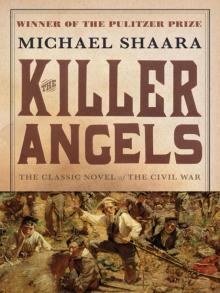 The Killer Angels: The Classic Novel of the Civil War
The Killer Angels: The Classic Novel of the Civil War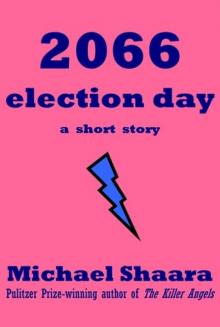 2066 Election Day
2066 Election Day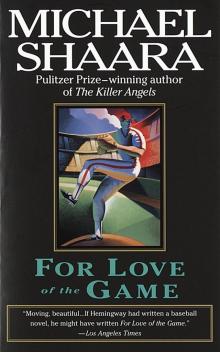 For Love of the Game
For Love of the Game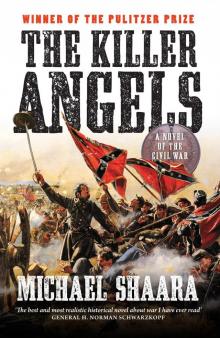 The Book
The Book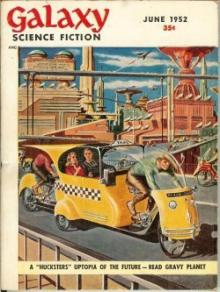 Galaxy
Galaxy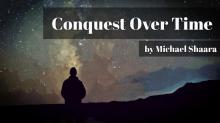 Conquest Over Time
Conquest Over Time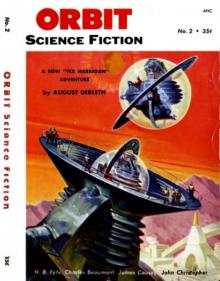 Potential Enemy
Potential Enemy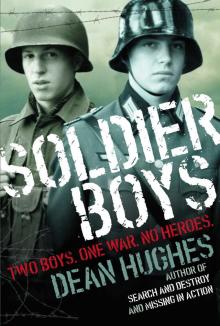 Soldier Boy
Soldier Boy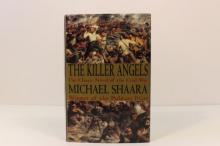 Wainer
Wainer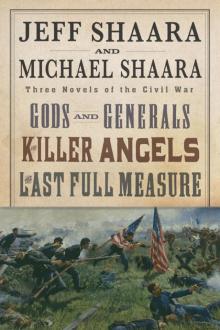 The Civil War Trilogy: Gods and Generals / the Killer Angels / the Last Full Measure
The Civil War Trilogy: Gods and Generals / the Killer Angels / the Last Full Measure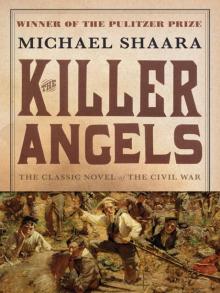 The Killer Angels
The Killer Angels